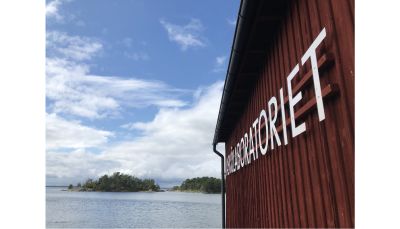Application Deadline Extended to 5 June 2022
For the eighth time, we offer an international Summer School on the beautiful island of Askö in the Swedish skerries south of Stockholm, a unique social and learning experience. We currently assume and prepare for an on-site Summer School on Askö, like in the previous years except 2020. In the event that the course cannot be given on Askö, we will divert to the online format which was carried out succesfully in 2020.
The course will focus on past and future changes in climate of the Baltic Sea region. The Baltic Sea is a semi-enclosed sea with a large freshwater supply from rivers of the adjacent catchment area in the transition zone between maritime and continental climates in northern Europe. Many long-term observational data are available and provide a good knowledge about oceanic changes during the past two centuries and even longer periods. Proxy-data of the past 1,000 to 2,000 years bear witness of a pronounced climate variability in the region.
Students will be introduced into fundamental processes of the atmosphere, ocean, sea-ice and land surface with relevance for the climate system. We will start from basic principles and equations of motion that describe the circulation and dynamics in the atmosphere, ocean and sea-ice. The available knowledge in the literature about water and energy balances will be presented. Further basic methods of the analysis and modeling of the regional climate system will be introduced, including the statistical analysis of time series to identify changes in regional climate. We will explain atmospheric pressure patterns of the large-scale circulation like the North Atlantic circulation with influence on the Baltic Sea and the corresponding catchment area.
The students will also be introduced into the functioning of the wind-driven and thermohaline circulations of the Baltic Sea. Furthermore, the course will deal with coupled atmosphere-ocean climate models, climate change, the greenhouse gas effect and other drivers of regional climate, dynamical downscaling, and the variability of circulation and regional climate. We will also study the possible impact of climate change on the marine ecosystem including biogeochemical cycles.
A holistic Earth System approach will be presented although the main focus of the course is on the physical aspects of changing climate. In addition to lectures, tutorials, exercises and literature studies the course will give the students the opportunity to discuss the learned topics further during group exercises.
Every year many students from the entire Baltic Sea region apply for taking part in the Summer School, which is reflected in the international flair that is spread by the multi-cultural composition of the group.
Organizer: Rostock University in cooperation with Leibniz Institute for Baltic Sea Research Warnemünde and the Baltic Earth programme through the International Baltic Earth Secretariat at Helmholtz-Zentrum Hereon.
The Summer School is hosted by Askö Laboratory of Stockholm University, Baltic Sea Centre.
Course site: Askö Laboratory situated 80 km south of Stockholm in the Swedish archipelago.
Website: http://www.su.se/ostersjocentrum/english/askö-laboratory
Course period: Starting Monday 22 August, through Monday 29 August 2022. Detailed times please take from the schedule (available in due time).
Estimated number of participants: ~ 10-15 students from all Baltic Sea countries.
Costs: Accommodation and all meals are provided free of charge on Askö. Travel costs will not be reimbursed but limited funds are available and applications for travel support are welcome together with your application (please add a brief motivation).
Lecturers and Exercises:
See agenda.
Credits:
3 ECTS for the successful participation (exam) in the course.
Applications/Eligibility: This school is primarily intended for master students in geosciences and associated fields.


